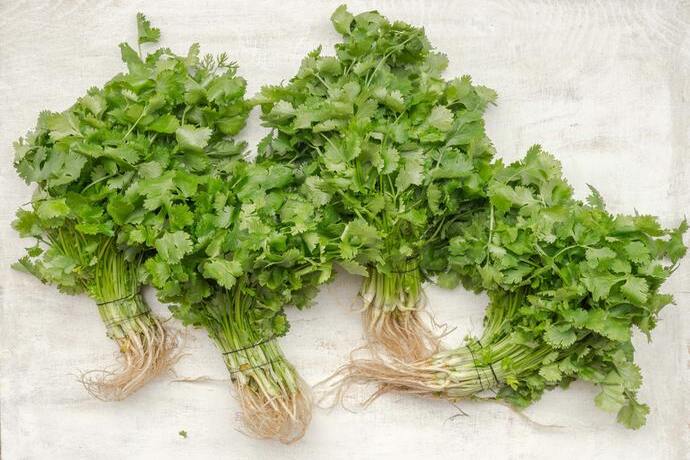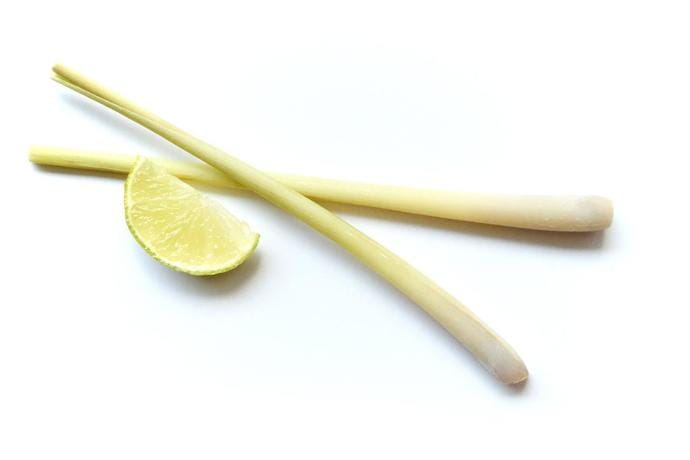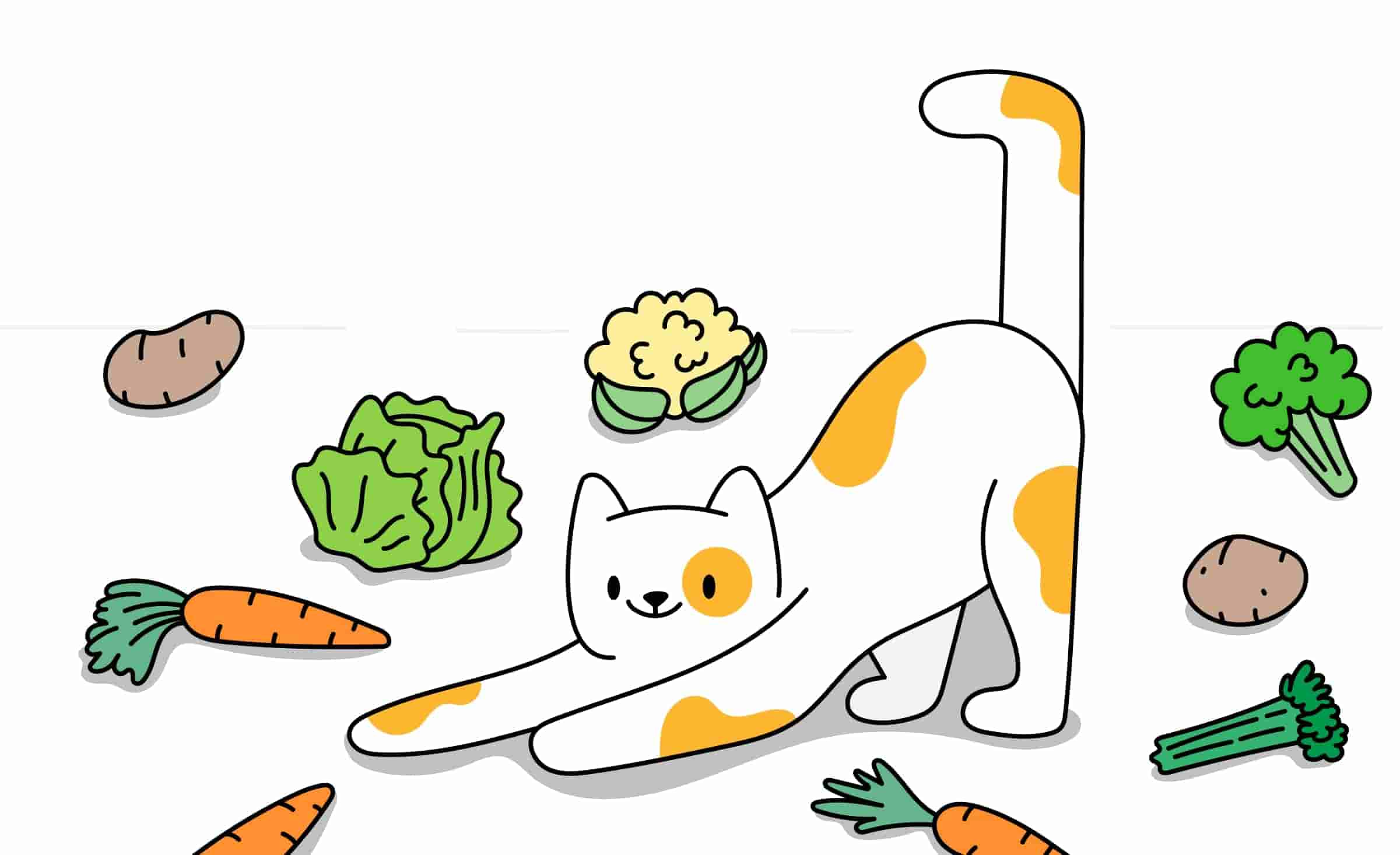Maybe you're thinking of adding more vegetables to your cat's diet, or perhaps you're vegan and are wondering whether you can apply the same lifestyle to your cat as well. Whatever the reason, it's important to understand the nature of cats and what would be beneficial for their health while being aware of what's dangerous for them.
Stop Googling - Ask a Real Vet
Can cats eat vegetables? | Potatoes | Broccoli | Carrots | Spinach | Lettuce | Celery | Asparagus | Cauliflower | Garlic | Kale | Ginger | Onions | Sweet Potatoes | What about herbs? | Parsley | Rosemary | Thyme | Basil | Mint | Cilantro | Lemongrass
Can cats eat vegetables?
The fact is that cats have different nutritional needs than humans (and dogs, for that matter). And while a diet that includes lots of various vegetables proves healthy for us, this doesn't quite hold true for our feline friends. Cats are obligate carnivores, so the meat is necessary for their survival and thus should make up the majority of their meals.
However, offering them small amounts of certain types of vegetables (to supplement their meals or as a snack) can provide some health benefits for them as well. If you're thinking of adding vegetables to your feline friend's diet, you might be wondering what vegetables can cats eat and how much? Which vegetables are toxic, and which ones are safe? Let's find out more about these veggies and how they may affect our cats.
Potatoes

Can cats eat potatoes? Sure, if served without the skin, and in moderation. Cooked potatoes are used in some cat food to provide grain-free and gluten-free carbohydrates as a supplementary addition to meat in its ingredients. As long as it's cooked well, cats usually have no problem digesting potatoes. When it comes to mashed potatoes, they are not so great for felines. Such recipes often include cheese, butter, milk, making them unwanted for a proper cat's diet.
Meanwhile, can cats have potatoes in their raw form? Remember to never feed them raw potatoes or potato skins. It's dangerous for cats because it contains solanine, a chemical that can be toxic as it can lead to damaging your cat's nervous system as well as their digestion. The leaves and stems also contain compounds toxic to cats, so remember to keep them away.
Broccoli

Broccoli has numerous nutritional benefits for humans, but can cats eat broccoli, and is it safe for cats? The answer is yes, and it's healthy for them as well. Broccoli is packed with vitamin C & carotenoids, is rich in dietary fiber, and is an excellent source of antioxidants for your cat. All these benefits make it one of the healthiest vegetables that you can feed your cat. For digestibility, it's best served steamed, blanched, or boiled.
Broccoli is also great for satisfying your kittie's plant-chewing cravings. If you see your houseplants ruined, serve your cat plain and unseasoned broccoli instead. Even though broccoli is non-toxic to cats, offer your kitten a small bite first. This way, you can track how your cat reacts and potentially add more broccoli later on.
Carrots

Can cats eat carrots? Fortunately, yes. Rich in beta carotene and contains numerous vitamins and minerals (in particular vitamin A that is essential to felines), carrots are great for your cat's health. Not to mention, it is also a good source of fiber that is beneficial for digestion, especially when your cat tends to be constipated.
Meanwhile, can cats have carrots in their raw form? It might be hard for your cat to chew and digest raw carrots, so it's best to offer it cooked (preferably boiled, blanched, or steamed without any salt or seasonings). Also, raw carrots can be a choking hazard, especially if you give your cat a big piece. If you want to offer this veg to a cat, make sure to slice it properly.
Spinach

Spinach contains lots of vitamins, minerals, and is an excellent source of dietary fiber. It's good for humans, but can cats eat spinach? Yes, they can, and they absolutely should. The relevant point is that top-notch cat food manufacturers add spinach for quite some time. Its high fiber content, low calories, and plenty of vitamins are great for kitties, making it a suitable dietary supplement.
Spinach has the best qualities when steamed, as it becomes easier for digestion. Do note that feeding your cat spinach is wrong if they have a history of having calcium oxalate bladder stones in the past as spinach has high amounts of calcium and oxalate. But if your kitty's overall health is fine, feel free to include some spinach in your feline's diet.
Lettuce

Can cats eat lettuce? Yes. For one thing, lettuce has high water content, making it a good option for cats who have some problems getting hydrated. Another benefit is that lettuce is low in calories, so you won't have to worry about your cat gaining much weight if they had it as a snack. Lettuce is also high in fiber, which can help your cat in the poop department.
Lettuce contains plenty of vitamin A, K, and folate. Also, don't forget that kitties like to chew plants. That's why lettuce, being safe and healthy for felines, is a perfect pick if your cat is fond of gnawing houseplants.
Celery

We've been told that celery is good for us, but can cats eat celery? Yes, but in moderation. Similar to their reaction towards catnip, many cats have a liking for celery leaves. You see, apart from rubbing and rolling themselves on celery leaves, they like munching on it too. Good thing it's safe for cats when given in small amounts.
Celery is high in fiber and contains lots of vitamins and minerals that can benefit your cat. Just remember not to give too much as overeating might cause stomach irritation, and in extreme cases, severe diarrhea. What's more, slicing celery is a must since it can become a choking hazard.
Asparagus

Cats can eat asparagus, but only in small amounts. Asparagus is high in dietary fiber, which can be good for your cat's digestion and help facilitate a healthy bowel movement. It's also good if you're trying to manage your cat's weight because asparagus will allow them to feel full longer. Not to mention, it also has a low-calorie content.
Too much asparagus can be detrimental to your cat's health because of its high alkaline content. Specifically, too much of it can affect the pH of your cat's urine, which can lead to bladder stones. Because of this, it's best to feed it only as a snack or a supplement to your cat's meaty meal.
Cauliflower

Cauliflower is entirely safe for cats. One benefit of cauliflower is that it contains antioxidants that reduce inflammation, which can benefit cats with conditions such as arthritis. Vets also suggest that this veggie has anti-cancer properties. Finally, it's high in fiber for better digestion and bowel movement. Feel free to give your cat some boiled cauliflower, combined with broccoli.
As with other vegetables that are safe for cats, remember that too much is not entirely safe. With cauliflower, for example, big portions may result in explosive diarrhea. It's particularly true when it is given in its raw form, so better steam cauliflower before offering it to your pet. Remember to remove the leaves and stems as well.
Garlic

Well-loved by many humans, garlic has been a staple in every kitchen. Meanwhile, a common question that cat parents ask when feeding their cat is — Can cats eat garlic? Unfortunately not. Even just one clove of garlic can be toxic to cats, possibly resulting in organ damage or failure, and can even be fatal.
Garlic is part of the family of allium, together with onions, leeks, chives, and shallots. While humans can easily digest these vegetables, it's not the case with cats. Ingesting these vegetables can lead to hemolytic anemia as a result of damaging the red blood cells.
But what makes garlic especially concerning (compared to other vegetables in the allium family)? Pet Poison Helpline states that the toxicity of garlic is about five times more than onions and leeks. And while a cat's breed, overall health, and weight may also be factors when estimating garlic toxicity in cats, there is an undeniable risk for all felines.
Since garlic is very toxic for cats, immediate medical care may be warranted if a cat has ingested it. And while pet emergencies can get overwhelming, there are ways to prepare for such incidents. One way is by subscribing to pet insurance or pet insurance alternatives such as the Pet Emergency Fund by Petcube. By doing so, you are assured of a financial net and the support needed in caring for your pet during critical times.
At less that $1 per day, a subscription to Pet Emergency Fund offers annual coverage of $3000 for upto 6 pets. They also don’t discriminate since pets are welcomed regardless of age, breed, and medical history. Not to mention, a subscription also gives you access to a 24/7 online vet service so you can consult with certified veterinarians about your pet’s health.
Ready to invest in your pet’s health. And as one of our blog readers, we are giving you an exclusive 27% discount if you follow this link.
Kale

Cats can indeed eat kale, and it's safe to be given either raw or cooked, but in small amounts. Kale has high fiber content, which is good for your cat's digestive system. It also contains enzymes that can help your cat digest meat better.
Too much kale, however, poses a risk of causing Heinz body anemia (although the risk is much lower than with onions and garlic).
Ginger

Ginger isn't toxic to cats and may even help with some gastrointestinal problems, like a mild case of food poisoning. Too much of it, however, can irritate your kitty's stomach, so give it in moderation. Also, ginger is not recommended to cats with gallbladder issues.
And yeah, hide gingerbread cookies and other sweet treats due to their high sugar content, which can cause obesity and dental issues.
Onions

Can cats eat onions? Cat parents must be wary of foods that are part of the allium family (where onion belongs) because these are considered dangerously toxic to cats. Even small amounts may endanger your cat's health. Ingesting onions can lead to Heinz body anemia, organ damage or failure. Some of the symptoms of onions' toxicity include weakness, vomiting, lethargy, and fainting.
In some cases, it can even be fatal if your cat didn't receive immediate veterinary care after having ingested it (especially if it's raw). Never try to mix onions, either raw or cooked, with your kitty's food.
Sweet Potatoes

It's safe to give your cat some sweet potato if cooked – ideally by steaming, boiling, or baking it without any salt or seasoning. Rich in fiber, sweet potato can help your cat's poop department (especially if they suffer from constipation) if given in small amounts. On the other hand, too much of it can cause digestive issues, like vomiting or diarrhea.
Can cats have sweet potatoes in raw form? The same with humans, eating sweet potatoes raw is harmful to your cat's digestive system, so make sure to cook them before treating your kitty.
What about herbs?
While giving an occasional veggie to your cat is absolutely fine, you might wonder what herbs to share. Generally, felines are fond of herbs because of their recognizable smell.
Cats are not able to metabolize the same way we do. Still, most herbs, despite such digestive nuances, are still great for felines. Some of them can be beneficial for felines because they provide your cat with many antioxidants and other nutrients. Read on to find out which herbs work well with your kitty's diet and in what amounts.
Parsley

Parsley is rich in calcium, potassium, folic acid, and vitamins (A, B-Complex, C, and K). Even though this herb has numerous benefits health benefits for humans, parsley is toxic to cats if eaten in large amounts. You shouldn't panic if your cat eats just a few leaves, but consult a vet if you suspect that your kitty have ingested too much of this herb. With Vet Chat, you can consult this question and much more with a certified specialist online.
Rosemary

Rosemary is considered non-toxic and safe to cats, being a superb source of vitamins A and C and minerals, such as calcium, iron, manganese, and folate. While too much rosemary may be harmful, you won't have to worry because cats usually don't take over a few nibbles since they are discouraged by the intense flavor that the herb emits.
Rosemary also contains volatile oils that might upset feline's stomach. But once again, due to this herb's intense flavor, it is unlikely that your kitty will gnaw rosemary all the time.
Thyme

Thyme is non-toxic and safe for felines. This herb is also a great source of antioxidants, dietary fiber, vitamins A & C, iron, calcium, riboflavin, manganese, copper, and magnesium.
Thyme can help your cat improve their immune system and prevent bacterial or fungal growth. Feel free to experiment with this herb since its health benefits are too good to resist.
Basil

Basil is non-toxic to cats. It contains vitamin C, iron, calcium, and potassium that is good for your cat's health. In small amounts, basil can prevent cellular damage, calm your cat down, and provide relief to cats with arthritis.
Your cat can enjoy some basil both cooked or raw. As with other herbs, it should be offered only in tiny amounts.
Mint

Unlike catmint or catnip, mint and cats might not go well together. Its including stems, leaves, and flowers are not safe for cats as they contain essential oils that are considered toxic to cats and other animals such as dogs and horses.
The garden mint variety contains essential oils that relax a cat's esophageal valve. And when a cat is not feeling well, this is likely to result in vomiting. It also causes adverse effects in cats that have intestine, bowel, or liver issues (in particular the pennyroyal mint species).
Other possible effects of ingesting mint in cats include diarrhea, allergic reactions, skin irritations, heartburn, and anaphylaxis.
Cilantro

For those wondering if cats can eat cilantro, the answer is positive. Raw cilantro are a good source of vitamins (A, B1, B2, B3, B5, B6, B9, C, E, and K) and minerals (iron, calcium, magnesium, phosphorous, manganese, potassium, zinc, and sodium). Thanks to its antioxidant and anti-inflammatory properties, cilantro seems to be a decent addition to your cat's diet.
However, remember not to give too much of it as it can cause vomiting, stomach upset, gas, and diarrhea in your cat. You can also find cilantro in dozens of nutritionally balanced commercial foods. That's why you should somewhat limit how much cilantro your cat gets. Sometimes, a kitty can "prey" it in your garden if you have some.
Lemongrass

Is lemongrass safe for cats? Unfortunately not. Lemongrass is toxic to cats, dogs, and some other animals due to its essential oils and cyanogenic glycosides. They can mess up your cat's digestive system as cats don't have the enzymes necessary to digest these components well.
Cats are attracted to lemongrass, and a few nibbles probably won't cause too much harm. However, you should lean on the side of caution and make sure your cat doesn't eat much of it, if at all.
Was this article helpful?
Help us make our articles even better









